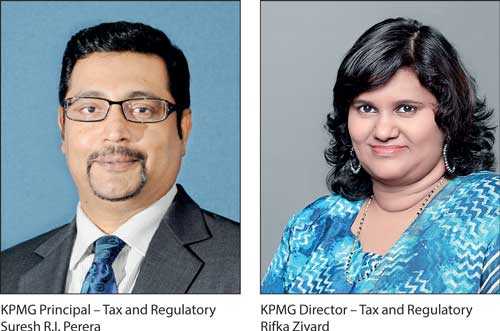Thursday Feb 19, 2026
Thursday Feb 19, 2026
Monday, 17 February 2020 01:03 - - {{hitsCtrl.values.hits}}
Although there have been indications that the withholding mechanism will be scrapped from 1 April, an unexpected notification issued by the Inland Revenue Department (IRD) scrapped the withholding tax regime for payments made to residents (including employment income) with effect from 1 January.
Employment income
The latest web notices issued by the Inland Revenue Department on 5 February and 12 February have preponed the proposal to abolish the withholding on employment income to 1 January. The salaries have been already paid by the companies and the employment income has been subject to withholding as per the initial web notice issued on 31 December 2019 which provides the revised tax slabs and rates. As per the notice, employers have been instructed to refund the taxes withheld by them for the month of January. The latest web notice does not refer to the previous web notices and neither does it seek to rescind the earlier notice. 
The notice issued by the Inland Revenue Department dated 12 February creates a dilemma as it states withholding on employment is only removed for resident employees while the 5 February notification stated that withholding on any employment receipts to any resident or non-resident individual is removed with effect from 1 January.
The Inland Revenue Department notifies that the Income Tax should be declared from all sources and payments should be made on a quarterly basis subject to the provisions of the Inland Revenue Act. It also states that if any person is not registered for Income Tax, one is required to register with the IRD. However the notice fails to address how one should calculate the taxes to be paid, since tax has been paid under withholding by employer for the previous nine months, and whether a payment is due on 15 February from a person who only has income sourced from employment, interest and dividends. The Inland Revenue Department should arrange to clearly notify the tax payers of the requirement.
Payments made to a resident person
The withholding of taxes has been removed not only from employment taxes but also from any payment made to a resident person such as interest, dividends, rent, etc. The Notice instructs the Withholding Agent to refrain from withholding for the month of January 2020 onwards and to also remit to the withholdee any such amounts that have been withheld for the month of January 2020. Implementing this proposal to remit amounts withheld to the withholdee is a daunting task given that the withholding agent has to verify whether the withholdee is a ‘resident’ for Sri Lankan tax purposes. In the case of a bank, it would need to verify whether the account holder is a tax resident of Sri Lanka prior to remitting the same. Banks may have to get a declaration from the account holders on their current status. Operationalising the instruction given by the Inland Revenue Department maybe a daunting task.
Payments made to a non-resident person
A non-resident continues to be subject to withholding as per the notification (other than payment of dividends which is exempt). Whether non-residents will be subject to withholding from employment is a further dilemma that arises as explained above. Payments to non-residents if subject to withholding will be a final tax as per the provisions of the Inland Revenue Act unless such non-resident has a permanent establishment in Sri Lanka.
Withholding on certain payments
Payments of winnings from a lottery, reward, betting or gambling and sale of gems will continue to be subject to withholding.
Self-assessment scheme
When the withholding scheme is withdrawn, it doesn’t mean that the obligation to pay Income Tax has been removed unless a specific exemption has been introduced. Hence, an employee now needs to carry out their obligation of settling the taxes applicable on their income from 1 January by adopting the self-assessment scheme. All obligations of filing estimates, making instalment payments, computation of tax liabilities and filing of the Return of Income now befalls the employee. The self-assessment obligations will now have to be carried out by every resident person who is not subject to withholding (subject to the tax free allowance). For example a deposit/account holder who receives interest income (subject to the threshold) is liable to compute its taxes by applying the slab rates and filing the return of income.
Demystifying the latest tax reforms
The latest tax reform notification includes many other areas in addition to the withholding mechanism such as new exemptions, revision of tax rates and qualifying payment reliefs under Income Tax. Further reforms have been introduced for Value Added Tax, Nation Building Tax, Economic Services Charge, Debt Repayment Levy, Port and Airport Development Levy, etc.
The KPMG Academy together with the International Chamber of Commerce Sri Lanka (ICCSL) and the Daily FT has organised presentations and panel discussion on ‘Demystifying the latest Tax Reforms’ to delineate the changes which are taking place in the Sri Lankan tax regime. The forum will be held on 25 February at Hilton Colombo Residence where the presentations will be delivered by KPMG Principal – Tax and Regulatory Suresh R.I. Perera, and Director – Tax and Regulatory Rifka Ziyard.
Inland Revenue Department Deputy Commissioner General, ICT, Administration and Tax Operational Support D.R.S. Hapuarachchi, Central Bank of Sri Lanka Deputy Director of Foreign Exchange W.S. Prasanna, ICCSL Secretary and World Express Ltd. CEO Shanil Fernando, BDO Partner Managing Partner and People’s Bank Chairman Sujeewa Rajapaksha, Access Engineering PLC Managing Director Christopher Joshua and Hotels Association of Sri Lanka President Sanath Ukwatte, DFCC Bank CEO Lakshman Silva, Commercial Bank of Ceylon PLC CFO K.D. Nandika Buddhipala will join the panel and the session will be moderated by Daily FT Editor Nisthar Cassim.